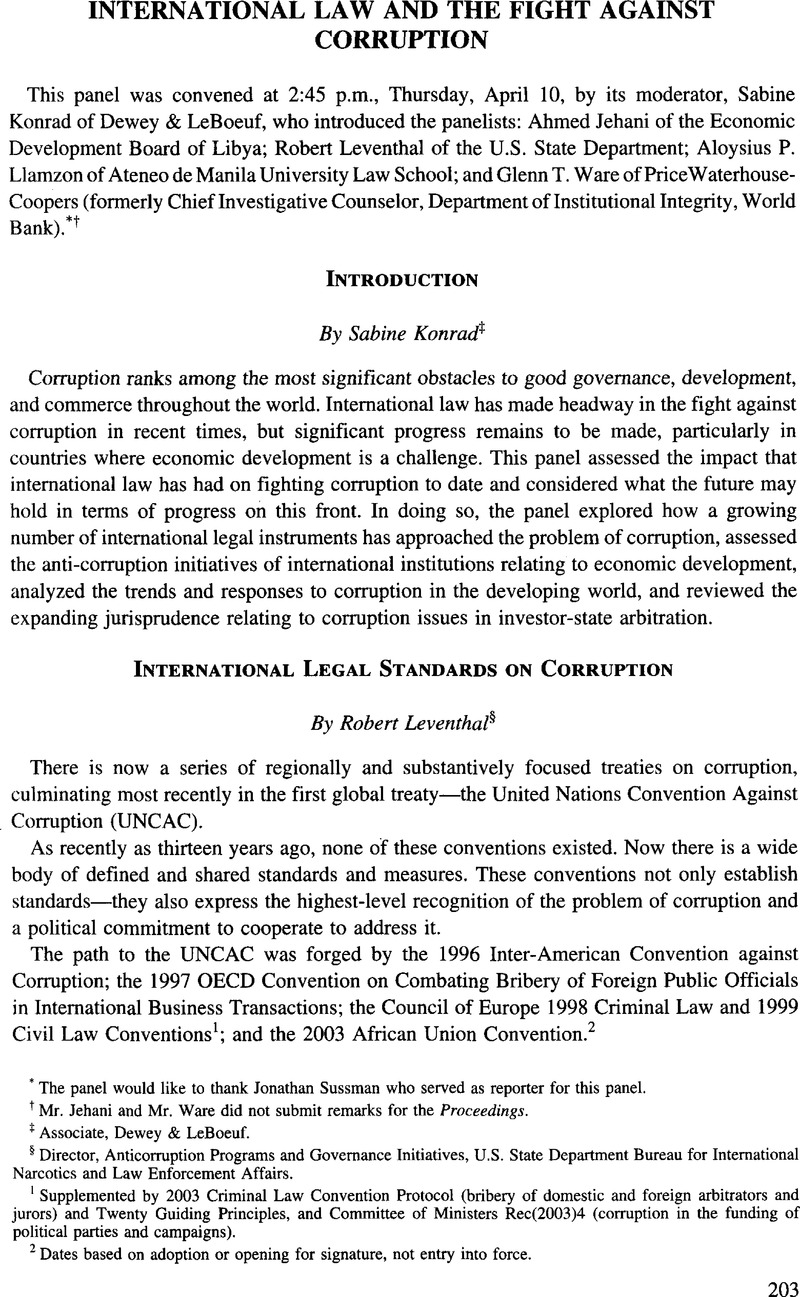Article contents
International Legal Standards on Corruption
Published online by Cambridge University Press: 28 February 2017
Abstract

- Type
- International Law and the Fight Against Corruption
- Information
- Copyright
- Copyright © American Society of International Law 2008
References
1 Supplemented by 2003 Criminal Law Convention Protocol (bribery of domestic and foreign arbitrators and jurors) and Twenty Guiding Principles, and Committee of Ministers Rec(2003)4 (corruption in the funding of political parties and campaigns).
2 Dates based on adoption or opening for signature, not entry into force.
3 European Union Convention on the protection of the communities’ financial interests and the fight against corruption, First and Second Protocol; European Union Convention on the fight against corruption involving officials of the European Communities or officials of Member States.
4 UN Transnational Organized Crime Convention and the Protocol to Prevent, Suppress and Punish Trafficking in Persons, Especially Women and Children.
5 OECD Istanbul Action Plan.
6 Stability Pact Anticorruption Initiative, now SEE Regional Anticorruption Initiative.
7 UNDP/OECD Good Governance for Development initiative.
8 Asia-Pacific Economic Coordination Anti-Corruption and Transparency Task Force and Asian Development Bank/OECD Anti-Corruption Initiative.
9 E.g., codes of conduct, conflict of interest, declarations of assets, government hiring and procurement, and whistleblower protection.
10 E.g., active or passive bribery of domestic public officials; transnational bribery; and illicit enrichment.
11 First round of review (preventive mechanisms, access to information, civil society, mechanisms for reporting, central authorities) concluded in March 2006; second round started in December 2006, covering criminal provisions, whistleblower protections, and government procurement and hiring.
12 15 U.S.C. §§ 78dd-l, et seq.
13 The other OECD anti-bribery instruments include the following: the Commentaries on the OECD Anti-Bribery Convention, the 1997 Revised Recommendation of the Council on Combating Bribery in International Business Transactions, and 1996 Recommendation of the Council on the Tax Deductibility of Bribes to Foreign Public Officials.
14 Article 1 - The Offence of Bribery of Foreign Public Officials:
1. Each Party shall take such measures as may be necessary to establish that it is a criminal offence under its law for any person intentionally to offer, promise or give any undue pecuniary or other advantage, whether directly or through intermediaries, to a foreign public official, for that official or for a third party, in order that the official act or refrain from acting in relation to the performance of official duties, in order to obtain or retain business or other improper advantage in the conduct of international business. Note: Facilitating payments are permitted under the Convention.
15 “ ... the promising, giving or offering, directly or indirectly, of any undue advantage to anyone who asserts or confirms that he or she is able to exert an improper influence over the decision-making of any person referred to in Articles 2, 4 to 6 and 9 to 11 in consideration thereof, whether the undue advantage is for himself or herself or for anyone else ... “.
16 The United States is not a signatory.
17 The First and Second Rounds have covered specialized bodies, immunities, conflicts and other public administration issues, and other issues. The Third Round covers criminalization and transparency of party financing.
18 Liechtenstein and San Marino are the only CoE Member States which have not joined Greco.
19 To date, Argentina, Austria, Finland, France, Greece, Indonesia, Jordan, the Netherlands, Norway, Peru, Poland, Romania, Sweden, Tanzania, UK and the United States.
21 “Whenever the President finds that the entry of any aliens or of any class of aliens into the United States would be detrimental to the interests of the United States, he may by proclamation, and for such period as he shall deem necessary, suspend the entry of all aliens or any class of aliens as immigrants or nonimmigrants, or impose on the entry of aliens any restrictions he may deem to be appropriate.”
22 Sec. 4: “For purposes of this proclamation, ‘serious adverse effects on the national interests of the United States’ means serious adverse effects on the international economic activity of U.S. businesses, U.S. foreign assistance goals, the security of the United States against transnational crime and terrorism, or the stability of democratic institutions and nations.”
- 1
- Cited by


